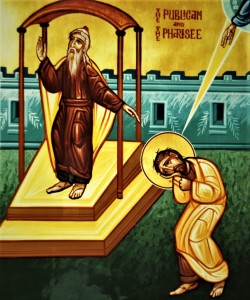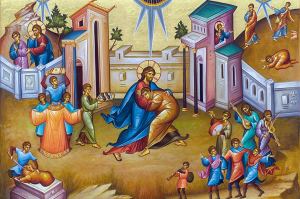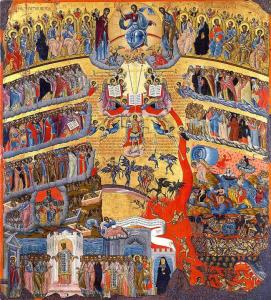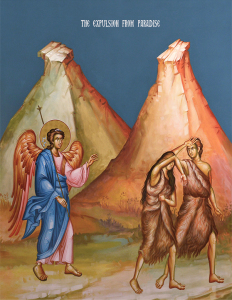Preparation for the Great Lent
The Great Lent is preceded by several preparatory Sundays and Weeks. The order of the services in the preparatory weeks and the Great Lent itself are set forth in the “Lenten Triodion”. It begins on the “Sunday of the Publican and the Pharisee”, and ends on Holy Saturday, which includes a 70-day period.
The Holy Great Lent (of forty days) is preceded by the “Sunday of the Publican and the Pharisee”, the “Sunday and the Week of the Prodigal Son”, the “Meat-fare Sunday and the Meat-fare Week” (“Sunday of the Terrible Judgement”) and the “Cheese-fare Sunday and the Cheese-fare Week”.
In the preparatory weeks the Church prepares the faithful for fasting by gradually introducing abstinence: after the regular week (when the whole week is fasting free, even on Wednesday and Friday) fasting is introduced on Wednesdays and Fridays; then follows a higher degree of preparatory abstinence – no consumption of meat.
In the preparatory Church services we remember the first days of the world and man, the blessed condition of the first parents (forebears) and their fall, the forthcoming (coming) of the Son of God on earth for the salvation of man, leading the faithful to fasting, repentance and spiritual struggle (striving, endeavour).
The synaxarium (compilation, index) on Cheesefare Saturday reads: “As the dukes, in front of the soldiers lined up for battle, reminding them of the former glorious warriors and their courage, so the soldiers, encouraged by the hope of victory, enter the battle with their souls and bodies. As it was in the past so is it now, the God-bearing fathers act wisely: before the beginning of the spiritual struggle, they encourage men and women, taking as an example those who have led an ascetic life, lead us to the fasting arena, so that we too may practice many and various virtues, each according to their strength. “First is love, then voluntary renunciation of evil deeds and actions, and finally fasting itself, which is not only abstinence from food, but also from bad words, from what we see (eyes), from anger, and simply put, to escape from every evil.”
This preparation for fasting for the Great Lent has been established since the Early Church. Thus, the famous preachers of the fourth century, St. Basil the Great, St. John Chrysostom and St. Cyril of Alexandria in their sermons and speeches spoke of abstinence in the week preceding the Great Lent. In the seventh century, the Venerable Theodore and Joseph Studit composed the service for the “Sunday of the Prodigal Son”, “Meat-fare Sunday” and “Cheese-fare Sunday”; in the ninth century, the Metropolitan of Nicomedia, George, also compiled the canon for the “Sunday of the Publican and the Pharisee”.
 Preparing for fasting and repentance, the Church in the first week, through the example of the Publican and the Pharisee, remembers humility as the true beginning and basis of repentance and every virtue. The Church also remembers the pride, as the main source of sins that defile man, separates him from his neighbours (fellow men), makes him an apostate, enslaving him to sinful loneliness.
Preparing for fasting and repentance, the Church in the first week, through the example of the Publican and the Pharisee, remembers humility as the true beginning and basis of repentance and every virtue. The Church also remembers the pride, as the main source of sins that defile man, separates him from his neighbours (fellow men), makes him an apostate, enslaving him to sinful loneliness.
Humility, as a path to spiritual heights, was shown to us by God the Word Himself, Who humbled Himself to the powerlessness of human nature – in the form of a servant. “He made Himself nothing by taking the very nature of a servant, being made in human likeness.” (Philippians 2: 7).
In order to awaken repentant feelings and guilt over sins, the Church sings: “After We Have Seen the Resurrection of Christ” and the 50th Psalm before the Gospel readings in the preparatory weeks of the Resurrection Morning Prayers, from the “Sunday of the Publican and the Pharisee” to the fifth week of Lent, before the sticherons (hymns): “Open the doors of repentance to me, O Life-giver.” And also: “Set me on the path of salvation, O Mother of God”, as well as “I thought of my multitude of angry thoughts, I repent, and I tremble.” Bringing the 70-day three-day period with the 70-year Babylonian exile of Israel, in the preparatory weeks the Church mourns the spiritual captivity of the New Israel by singing Psalm 136: “On the rivers of Babylon.”
At the base of the first sticheron – “Open the doors of repentance to me” – is the story of the Publican; the repentant sentiment can be seen. At the heart of the second song – “On the Road to Salvation” – lies the story of the Prodigal son. At the core of the third – “I thought of my multitude of angry thoughts ” – the prophecy of the Last Judgment can be seen.
 The “Sunday of the Prodigal Son” takes its name from the Gospel story read on that day (Luke 15: 11-32). The Church shows us the example of God’s inexhaustible mercy to every sinner who turns to God with sincere repentance. No sin can shake God’s love for men. The repentant and disgusted soul by sin, is permeated by the hope of God, and, the grace of God meets such a soul, loves, adorns and rejoices in reconciliation with it. The Church goes on to teach that the fullness and joy of life consists in a gracious union with God and constant communion with Him, and moving away from that communion serves as a source of spiritual misery.
The “Sunday of the Prodigal Son” takes its name from the Gospel story read on that day (Luke 15: 11-32). The Church shows us the example of God’s inexhaustible mercy to every sinner who turns to God with sincere repentance. No sin can shake God’s love for men. The repentant and disgusted soul by sin, is permeated by the hope of God, and, the grace of God meets such a soul, loves, adorns and rejoices in reconciliation with it. The Church goes on to teach that the fullness and joy of life consists in a gracious union with God and constant communion with Him, and moving away from that communion serves as a source of spiritual misery.
Pointing out the basis of true repentance in the “Sunday of the Publican and the Pharisee”, the Church reveals all the power of repentance: only through the true humility and repentance is forgiveness of sins possible. After repentance, not a single sinner should despair for the gracious help of our Heavenly Father.
 “Meat-fare Sunday” is also called the “Sunday of the Last Judgment”, in accordance to the liturgical Gospel read that day (Matthew 25: 31-46). On “Meat-fare Saturday”, which is also called the “Saturday of the universal parents”, the Church remembers all the dead from Adam to the present day, who served God faithfully, our fathers and brothers, and all our neighbours and relatives, It remembers and prays for every human being. Accordingly, the Church supplicates (prays) for all of them to have a good answer on the day of the Last Judgment, and a joyful reception at His (God’s) right hand, for those who have proved worthy of His Kingdom.
“Meat-fare Sunday” is also called the “Sunday of the Last Judgment”, in accordance to the liturgical Gospel read that day (Matthew 25: 31-46). On “Meat-fare Saturday”, which is also called the “Saturday of the universal parents”, the Church remembers all the dead from Adam to the present day, who served God faithfully, our fathers and brothers, and all our neighbours and relatives, It remembers and prays for every human being. Accordingly, the Church supplicates (prays) for all of them to have a good answer on the day of the Last Judgment, and a joyful reception at His (God’s) right hand, for those who have proved worthy of His Kingdom.
In accordance to its philanthropy, on Holy Saturday the Church prays especially for those who have fallen asleep (passed away) and been buried without proper church prayer: for those who have not received the “established psalms and songs of remembrance,” for those who have been “covered by water, carried away by waves, covered by an earthquake.” “For those whom were killed by murderers, and those burned by fire.” The Church also prays for those who have ended their lives beyond their comprehension, those who have suddenly reposed “suddenly out of pain and joy”, and for those whose end is not known.
Thoughts about the end of our life, at the mention of the deceased, sober our souls, the souls of us who forget eternity, and attach our soul to bodily and transient things.
Meat-fare Week is dedicated to the remembrance of the universal, last and Dreadful Judgment of the living and of the dead (Matthew 25: 31-46). This remembrance is necessary for people who sin, not to give in to carelessness and laziness for their salvation in the hope of God’s unspoken mercy. In the sticherons and troparions of the service for this Sunday, the Church depicts the consequences of the lawless life, when the sinner will stand before the unpleasant Judgment (with regard to the sinner) of God.
Remembering the Last Judgement of Christ, the Church, at the same time, shows the true meaning of the hope we have of God’s mercy. God is merciful, but He is also a righteous Judge. In the liturgical chants, the Lord Jesus Christ is called Righteous, and His Judgement – just and incorruptible. Both the people hardened by sin, and those who place their hope in the mercy of God, should be aware of the spiritual responsibility for their moral condition, while the Church with all Its service that day strives to direct them to the realisation of their sinfulness.
What type of deeds of repentance and correction of life are given special attention? First and most important are the deeds of love and mercy, because the Lord will pronounce His Judgment mainly according to the deeds of mercy, which were possible for everyone; certainly, not to mention the other virtues, which were not equally available to everyone. None of us can rightly say that we cannot help the hungry, give drink to the thirsty, visit the sick. These acts of mercy have their value when they are manifestations of the love that reigns in the heart, and is united with the spiritual deeds of mercy, through which we help our neighbours.
 The last preparatory week is called “Cheese fare Week”, or “Milky Week”, “Cheesy Week”. Dairy products are used in that week: milk, cheese, oil and eggs.
The last preparatory week is called “Cheese fare Week”, or “Milky Week”, “Cheesy Week”. Dairy products are used in that week: milk, cheese, oil and eggs.
Being tolerant to our weaknesses and gradually introducing us to the struggle of fasting, the Church established that, in the last week before the Great Lent, only dairy food is to be consumed, “the intention is for us to gradually move from eating meat and too much food, to be directed to strict abstinence… little by little, by turning away from delightful meals, to begin the struggle of fasting. ” During “Cheese-fare Week” on Wednesday and Friday, fasting is stricter, until dinner time (evening).
Through the hymns of the Holy Week (Cheese-fare Week), the Church shows us that this week is a narrow representation of repentance, a prelude of abstinence, a week of pre-purification. In its hymns, the Holy Church invites us to double abstinence (to increase our fasting twofold), mentioning the fall of our forbears, which arose precisely from non-abstinence.
On “Cheese-fare Saturday”, the memory of the holy men and women who shone in the asceticism of fasting is perfected. By the example of the holy ascetics, the Church strengthens us for spiritual asceticism: “by imitating the non-malice living, to perform many and various virtuous deeds, each according to their own strength”, remembering that the holy ascetics glorified in the Church were people dressed in powerless flesh, like us.
The last Sunday before the Great Lent in the Lenten Triodion is named: “Cheese-fare Sunday, the expulsion of Adam from paradise”. This day commemorates the expulsion of our first parents (forebears) from paradise.
https://preminportal.com.mk/polezno-i-potrebno/18505-podgotovka-za-velikiot-post-1

